Does your child struggle with believing they can learn something challenging? Maybe they give up easily or say things like “I can’t do this” or “I will never be good at this!” Learning Self-Efficacy Strategies can increase your child’s confidence and help them as they experience difficulties in learning new things.
Definition
Self-efficacy is an individual’s perceptions about their capabilities to perform at an expected level, achieve goals, and complete moderately challenging tasks (Gaumer Erickson & Noonan, 2018).
Students use Self-Efficacy Strategies to persist in learning.
Student Impacts
Teachers providing self-efficacy instruction and classroom practice observe student growth, including:
- Increased self-reflection and self-awareness
- Increased belief that ability grows with effort
- Improved confidence in their own abilities
- Improved quality and timeliness of work
- More openness to constructive feedback
Research in elementary and secondary education identifies proven student impacts from teaching self-efficacy.
- Students with stronger self-efficacy will engage more, work harder, and persist longer when they encounter difficulties (Zimmerman, 2000).
- Of many factors, self-efficacy has “the strongest positive and significant association” with life satisfaction (Moksnes et al., 2019, p. 226). It also helps to counteract many stressors, including peer pressure, school/leisure conflict, and school performance.
- By receiving explicit instruction in self-efficacy, students increase their interest in pursuing challenging careers (Falco & Summers, 2019).
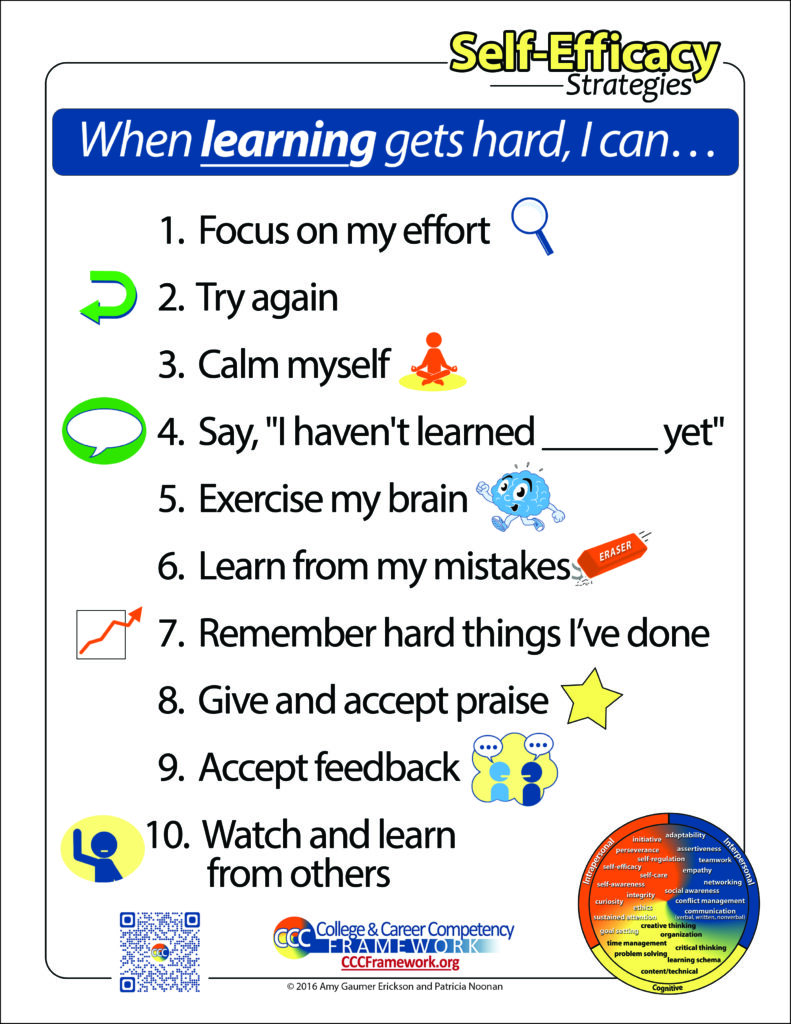
Learning self-efficacy helps children to persist when they encounter difficulties. Self-efficacy also helps students believe in their own ability and manage emotions when learning becomes challenging.
Watch the one-minute video What Is Self-Efficacy? with your child to learn more about what self-efficacy is and why it is important. Afterward, share examples of times when you didn’t feel confident and gave up rather than persevering. Ask your child to describe situations where they have experienced low self-efficacy, using these questions:
- When have you felt like giving up instead of continuing to try to learn or do something?
- Why do we sometimes feel like giving up instead of trying again?
- Describe a time when you didn’t give up and you learned something that was difficult. What did you say to yourself? What did you think about?
Explain that you are going to help them learn Self-Efficacy Strategies so they can understand how to keep trying when learning is difficult.
These four Self-Efficacy Strategies will help your child believe in their abilities: focus on my effort, exercise my brain, learn from my mistakes, and remember hard things I’ve done. Additional strategies are explained on the primary and secondary parent guidance.
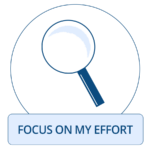
Focus on My Effort
Children need to make the connection between putting forth effort and making progress. When they understand that putting forth more effort will increase their progress, they can start to overcome obstacles to their learning. Understanding what effort is and what it feels like when they are using effort is the first step in helping your child understand how to focus on their effort.
Explain that believing you can do hard things starts with focusing on your effort. Effort means trying really hard and using a lot of energy. The energy can come from our bodies working hard or our brains working hard.
Provide a personal example of something challenging you eventually accomplished. Describe how you felt and what you were thinking when you began. Emphasize that you used effort (i.e., tried really hard) and didn’t give up even when you felt frustrated. Then ask your child to remember a time when they were frustrated because they couldn’t do something:
- How did it feel?
- What did you say to yourself? What did you do?
Watch they video Focus on My Effort and discuss what it feels like when you try really hard:
- What does focus mean?
- How do you know when you are focused?
- When have you focused on your effort to learn something?
Emphasize that focusing on effort is more important than focusing on the outcome. When we put forth effort, it is more likely that we will experience the outcome we want. When we are aware of our progress, it helps us know that effort and progress are related.
Discuss something challenging your child is currently learning and the amount of effort they are using. Then show them the Effort Meter and ask:
- What does your effort look like? Where would you rate yourself on the Effort Meter right now?
- How much progress have you made? What aspects of the challenging task can you do?
- What could you do to increase your effort?
Support your child in practicing the strategy focus on my effort by reviewing their progress on the challenging task they identified. Discuss what they could do to maintain or improve their effort. You can use the Effort Meter to guide your discussions anytime they need or want to learn something challenging.
You can reinforce what your child has learned about focusing on effort by asking them to research their favorite athlete, musician, or historical figure. Have them identify specific techniques the person used to focus on their effort and eventually become successful. Remind your child that they will experience difficulties in school, when learning a new sport, or when practicing a musical instrument. Tell them that, by focusing on their effort, they are learning to keep trying and overcoming their fear that they can’t do something.
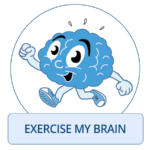
Exercise My Brain
Teaching your child about the brain can help them understand that intelligence isn’t fixed. The brain is like a muscle—when we practice something and analyze our mistakes to determine how to improve, we strengthen the pathways in our brain. The scientific term is neuroplasticity.
When your child practices a concept, makes mistakes, and uses those mistakes to improve, they strengthen their brain and grow their intelligence. Understanding the concept of neuroplasticity will help your child have a growth mindset about learning. Tell them to think about something they recently learned to do. Ask:
- How does it feel when you’re learning something new?
- How does it feel when you’re doing something you already know how to do?
- Why is there a difference between those two activities?
Watch the video Exercise My Brain with your child. Afterward, ask:
- How would you explain exercising your brain?
- When have you exercised your brain and gotten better at something?
Provide your child with an example of a time when you exercised your brain. Maybe it was completing a difficult class or learning a new aspect of your job. Include details about how difficult it was at first and how it felt as the task became easier as you strengthened the neuropathways in your brain.
Show your child the video The Truth About Your Brain. Afterward, tell your child to think about something they have recently learned to do. Then ask:
- What did it feel like when you were first learning _____?
- What did you do or say to yourself to help you keep learning?
- Now that you know what happens when you exercise your brain, what will you say to yourself the next time you want to learn something challenging?
You can help your child practice exercising their brain anytime they are learning a concept. Ask them to reflect on how much progress they have made and discuss how their brain is changing as they are learning. Remind them that learning something new is hard work and takes multiple attempts. Help them remember that practicing a concept many times is making their brain stronger.
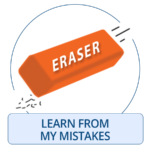
Learn From My Mistakes
Children often experience low self-efficacy when they make a mistake. This can be a mistake in their behavior or their learning. It can be difficult for them to accept when they make a mistake. They may feel embarrassed or blame others. When children don’t accept their mistakes and instead try to hide them, they are experiencing low self-efficacy.
You can support your child in building their self-efficacy by teaching them to learn from their mistakes. Explain that mistakes are normal. When they make a mistake, they should acknowledge it and take time to think about what they have learned by making the mistake. When they can identify how they might change their actions to improve, they are building self-efficacy.
Watch the video Learn From My Mistakes with your child. Afterward, discuss the key points. Ask:
- What is a mistake you recently made? How did it make you feel?
- What do you think you can learn from the mistake?
- What will you do the next time you make a mistake?
Share a mistake you recently made. Describe how you felt and what you learned from making the mistake. Emphasize that we all make mistakes and that we become better by thinking about them and identifying what we have learned.
Discuss each of these quotes with your child. Ask them to reflect on the meaning of each and its relationship to learning from our mistakes.
- Mistakes have the power to turn you into something better than you were before.
—Oscar Auliq-Ice - No matter how many mistakes you make or how slow your progress, you are still way ahead of everyone who isn’t trying.
—Tony Robbins - There are no mistakes or failures, only lessons.
—Denis Waitley
After discussing each of the quotes, ask your child to choose their favorite. Write the quote on a sheet of paper and ask them to draw a picture that represents the quote or ways they can learn from their mistakes. Consider asking them to find a quote about making mistakes from their favorite athlete or musician and posting it in their room.
You can also help your child understand how to learn from their mistakes by showing them the video Mistakes Are How I Learn, by Kiara Wilson. After the video, ask:
- When have you given up after you made a mistake?
- Why is it scary or discouraging to make mistakes?
- How will understanding that mistakes are learning opportunities make you feel the next time you make a mistake?
Support your child in understanding they can learn from their mistakes by reframing the conversation around mistakes. Instead of blaming others or feeling ashamed, openly discuss what they can learn from mistakes and how they can improve. Such reframing decreases children’s fear of taking on challenges and ultimately builds their belief in themselves.
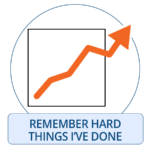
Remember Hard Things I’ve Done
The next strategy you can use to help your child improve self-efficacy is remember hard things I’ve done. By reflecting on difficult things they have learned to do in the past and ways they learned those things, children can use that knowledge to learn challenging things in the present.
Watch the video Remember Hard Things I’ve Done with your child. Afterward, ask:
- Why is it good to remember hard things you’ve done?
- How does thinking about the hard things you’ve done in the past help you with hard things you are learning now?
Emphasize that it’s important to think about challenging things we have learned and how we learned them. For example, are there techniques you learned by improving your shooting in basketball that you can apply to learning to multiply fractions? Maybe you practiced 20 minutes every day or asked someone to help you by providing feedback. Those are techniques you could use toward learning to multiply fractions.
Ask your child to divide a blank piece of paper in half. On the left side, have them list 1–2 hard things they’ve already learned to do. On the right side, help them identify 5–6 steps they took to learn those hard things. Finally, have your child identify a difficult concept they are currently working on, review the steps they listed for the hard things they’ve already learned, and identify which ones will help them learn the current difficult concept.
When your child is working on a new concept or challenging task, you can help them remember hard things they’ve done by naming similar things they have already learned and the actions that helped them learn those things. You can also remind them to add new items to the above list whenever they’ve mastered a concept. That way, there’s an ongoing list of what they’ve learned and how they’ve learned it.
Next Steps
- Practice focusing on effort by referring to characters in books, athletes, or musicians and talk about how they focused on effort. Discuss how effort and lack of effort impact progress or the ability to complete a task. Keep the Effort Meter posted and refer to it when your child needs to focus on their effort. You should also point out times when your child is focused on their effort and provide them with positive feedback related to putting forth effort.
- When your child is asked to practice a skill or redo an assignment they find challenging, remind them that, by practicing, they are exercising their brain. With each attempt, the pathways in their brain will become stronger. Identify where they have made progress and how they can continue to exercise their brain.
- Reframing conversations around mistakes will help your child learn from their mistakes and accept mistakes as a normal part of life. When they make a mistake in learning or behavior, discuss what they have learned and how they will modify their actions to improve. You can also show your child the video Mistakes Are How I Learn, by Kiara Wilson.
- You can help your child remember hard things they’ve done by keeping a list of concepts they’ve learned. Discuss the steps they took to learn these concepts and refer to the list when they become discouraged or overwhelmed with things they currently need to accomplish. Remind them to mentally review the list whenever they start to have strong feelings while learning something new.
